Energy Management and Climate Change
Impact on Business
Challenges and Opportunities
The global transition to sustainable energy presents both challenges and opportunities for CKPower. The Company recognizes the pressing need to expand its renewable energy portfolio while navigating regulatory shifts and evolving market dynamics. To address these challenges, CKPower has implemented strategic initiatives, including:
- Green Financing Initiatives: CKPower has accessed environmental funding through Green Bonds and Renewable Energy Certificates (RECs), reinforcing its commitment to clean energy expansion.
- Regulatory Preparedness: In anticipation of the Climate Change Act, set to take effect in 2026, CKPower is aligning its operations with upcoming regulations. This includes compliance with mandatory GHG reporting, adaptation to carbon pricing mechanisms such as carbon taxes and Emissions Trading Systems (ETS), and alignment with Thailand’s developing Taxonomy for Green Finance.
- Energy Risk Management: The Company prioritizes energy efficiency, resource optimization, and climate risk assessment to balance sustainability goals with stakeholder expectations.
Commitment
CKPower is dedicated to reaching its Net Zero emissions target by the year 2050 and aims to increase its renewable energy production to exceed 95% by 2043, primarily through hydropower and solar power. The Company is also focused on supporting and driving the creation and development of innovations to reduce energy consumption, optimize electricity production efficiency, and raise awareness about energy conservation throughout the organization value chain.
CKPower has integrated the United Nations Sustainable Development Goals (SDGs), particularly Goal 7: Affordable and Clean Energy, and Goal 13: Climate Action, as a framework in its business operations to promote collective action for a sustainable energy transition.
Furthermore, in response to the outcomes of the 29th United Nations Climate Change Conference (COP 29), CKPower is committed to limiting global temperatures below 1.5 degrees Celsius and intensifying its continuous efforts to reduce GHG emissions in support of long-term climate goals.
Operational Guidelines
1) Policies
2) Strategies and Strategic Plans
Energy Management and Climate Change Strategies
CKPower strives to become one of the region’s largest producers of electricity from renewables with one of the lowest carbon footprints. Currently, CKPower’s renewables-based energy generation accounts for 93% of its total renewable energy capacity, with a target to expand the proportion to exceed 95% by 2043 as well as to become a 100% renewable electricity organization (RE100) within the same year.
To support these goals, CKPower has developed the Energy Management and Climate Change Roadmap, which is aligned with international standards, such as:
- Task Force on Climate-Related Financial Disclosures (TCFD)
- IFRS S1 General Requirements for Disclosure of Sustainability-related Financial Information
- IFRS S2 Climate-related Disclosures
CKPower has conducted climate change risk and opportunity assessments to strategize and establish plans focused on achieving net-zero greenhouse gas emissions efficiently, with emphasis on five key strategies:
- Reduce energy consumption to decrease GHG emissions
- Improve energy efficiency in electricity production
- Increase renewables capacity
- Increase renewable energy consumption
- Expand business opportunities for green investments
These strategies encompass short-term, medium-term, and long-term planning to achieve Net-Zero greenhouse gas emissions, supported by effective governance and sustainable operations.
Energy Management and Climate Change Strategies |
||||||
|---|---|---|---|---|---|---|
| Strategies | Short-term Plans | Medium-term (5-year) Plans | Long-term Plans | |||
|
REDUCE
Reduce GHG Emissions
|
Developing a database on the organization’s energy consumption and GHG emissions.
|
Conducting annual climate-related risk and opportunity assessments
|
Developing climate change strategies.
|
Conducting annual climate-related risk and opportunity assessments.
|
Reducing GHG emissions by 45% by 2039.
|
Striving towards Net Zero GHG emissions by 2050.
|
|
IMPROVE
Improve Energy Efficiency
|
Implementing measures and increasing investments in decarbonization & contributing to GHG reduction projects.
|
Continuously optimizing energy efficiency
|
Conducting energy conservation and energy cost saving projects.
|
|||
|
IMPROVE
Increase Renewable Energy Capacity
|
93% Renewable energy capacity
|
Expanding renewable energy capacity
|
> 95% Renewable energy capacity
|
|||
|
IMPROVE
Shift to Renewable Energy Consumption
|
100% Renewable electricity consumption within organization including the use of Renewable Energy Certificates (RECs).
|
Offsetting residual GHG emissions and increasing GHG removals.
|
||||
|
IMPROVE
Monetize Renewable Assets
|
Issuing green bonds. Sale of Renewable Energy Certificates (RECs).
|
Preparing for the implementation of Internal Carbon Pricing
|
Diversifying into new businesses that leverage advanced renewable energy technologies
|
|||
Strategic Plans
Energy Management and Climate Change Strategies
CKPower has formed an Energy Management and Climate Change Committee, operating under the Corporate Governance, Risk Management, and Sustainable Development Committee and guided by the Sustainable Development Steering Committee. This committee sets strategic directions and goals in alignment with sustainability and climate change policies and operational frameworks, ensuring compliance with international standards and trends.
To ensure robust governance and execution, this committee oversees the implementation of energy and climate change strategies, working closely with teams from all power plants. CKPower has defined roles, responsibilities, performance indicators, and remuneration for managing plant operations. These executives are accountable for overseeing sustainability and climate change initiatives, ensuring they align with the Company’s goals. These executives collaborate with the Sustainability Supporting and Disclosure Working Team to provide quarterly performance reports to the Board of Directors.
To further bolster its operations in sustainability and climate change, CKPower has established energy conservation and climate change policies and set organizational targets for reducing energy usage and greenhouse gas emissions across both office and production processes. Employees are also encouraged to develop innovative solutions for reducing energy consumption, improving electricity production efficiency, and lowering GHG emissions, with the goal of enhancing awareness about energy conservation and climate change within all company units, thereby driving the achievement of the net-zero emissions goal.
Climate Risk Management
CKPower proactively assesses climate-related risks and opportunities across its operations in Thailand and Lao PDR. These assessments categorize risks into short-, medium-, and long-term timeframes, ensuring effective risk prioritization and mitigation planning. The results of these assessments are integrated into CKPower’s enterprise risk management framework for systematic and efficient management.
CKPower has adopted the Task Force on Climate-related Financial Disclosures (TCFD) framework, the IFRS S1 General Requirements for Disclosure of Sustainability-related Financial Information, and the IFRS S2 Climate-related Disclosures Standard in its assessments and in establishing clear management approaches to ensure CKPower’s adaptability and growth amid climate change challenges.
Green Financing Activities in 2024
Renewable Energy Certificate (RECs), Trading Program
CKPower continues to expand green investment opportunities while generating additional revenue through the sale of Renewable Energy Certificates (RECs). Following registration with relevant agencies to issue RECs, CKPower has been exploring the market and selling these certificates to companies seeking to offset their Scope 2 emissions.
The program not only supports partners’ climate change mitigation efforts but also reinforces CKPower’s environmental initiatives, enhances its image as a sustainability-focused organization, and creates new business opportunities in support of sustainability goals at both corporate and national levels.
Internal Carbon Pricing (ICP)
CKPower is currently studying Internal Carbon Pricing (ICP) for implementation across its operations. This mechanism will enable the Company to effectively analyze costs and returns from GHG emission reductions and prepare for climate-related government regulations.
ICP data will be integrated into CKPower’s strategic planning and GHG management to sustainably support CKPower’s emission reduction targets.
Long-term targets, 2024 targets, and 2024 achievements
| Energy Management and Climate Change | |||||||
|---|---|---|---|---|---|---|---|
| Topic | Long-term Targets | 2024 Targets | 2024 Achievements | ||||
Energy Consumption
|
100%Renewable electricity consumption within the organization by 2043 |
Renewable electricity consumption within the organization |
93% |
93% |
|||
>95%Renewable energy capacity by 2043 |
Renewable energy capacity |
93% |
93% |
||||
| Total energy consumption within organization |
2,125,923.79
|
2,115,423.22
|
|||||
| Energy intensity |
0.20
|
0.20
|
|||||
GHG Emissions
|
Net ZeroGHG emissions by 2050 |
GHG Scope 1 & 2 emissions |
727,747.41
|
721,140.86
|
|||
Reduction of GHG emissions
6,606.55
|
|||||||
| GHG Scope 1 emissions |
725,998.74
|
719,161.16
|
|||||
| GHG Scope 2 emissions |
1,748.67
|
1,979.70
|
|||||
| GHG Scope 3 emissions |
119,586.41
|
181,920.80
|
|||||
| GHG emissions intensity |
0.0677
|
0.0689
|
|||||
Climate Change and Energy Management Performance
| Climate Change and Energy Management Performance | ||
|---|---|---|
| Energy consumption within organization | GHG scope 1 emissions | GHG emissions scope 1 and 2 |
| Energy consumption within organization per total energy generated | GHG scope 2 emissions | GHG emissions scope 1 and 2 per total energy generated |
Project Highlights in 2024
1) Lower Gas Pressure - Better Heat Rate Project at Bangpa-in Cogeneration Power Plant
The Bangpa-in Cogeneration Power Plant implemented an efficiency optimization initiative to reduce energy losses in electricity generation. The project involves comprehensive system inspection and analysis and the optimization of fluid pressure points in the piping, leading to decreased energy consumption for gas compressors.

Outcomes in 2024
688
MWh
343.9
tCO2e/year
2,561,520
baht
This initiativeexemplifies CKPower’s dedication to minimizing environmental impacts through strategic emissions reduction and energy optimization, in alignmentwith the Company’s sustainable development targets.
2) Steam Turbine Load Adjustment Project Phase 2 at Bangpa-in Cogeneration Power Plant
Due to reduced customer steam demand, excess steam was being released to condensers, leading toenergy wastage. CKPower identified this as an opportunity to harness the surplus steam for power generation.

Action undertaken:
- Conducted comprehensive engineering studies to optimize energy efficiency
- Enhanced steam turbine efficiency and developed advanced control systems to utilize excess steam for additional power generation.
Outcomes in 2024
generation capacity achieved
25.3
MW
through excess steam utilization
1.3
MW
for gas compression
1,422
MWh
5,295,432
baht
657.21
tCO2e
Achievement:
This initiative reinforces CKPower’s commitment to optimizing energy efficiency and minimizing resource wastage.
3) Deactivation of a Cooling Fan during Off-peak Periods (00:00-06:00 hrs.) at Bangpa-in Cogeneration Power Plant
The Bangpa-in Cogeneration Power Plant launched an off-peak energy optimization initiative, in which cooling fans were shut down during 00:00-06:00 hours to eliminate unnecessary power consumption and maximize energy management efficiency.

Outcomes in 2024
34.3
MWh/year
43.52
tCO2e/year
350,648
baht/year
Achievement:
This initiative demonstrates CKPower’s commitment to energy efficiency enhancement, cost optimization, and environmental impact reduction through lower GHG emissions. The improvements have strengthened the plant’s operational sustainability and underscore CKPower’s commitment to achieving its sustainability targets and efficient energy management.
4) Cooling Tower Optimization Project at Bangpa-in Cogeneration Power Plant
A cooling tower management initiative was launched to regulate ventilation fan activation and adjust cooling water pump operations, enhancing energy and water efficiency

Outcomes in 2024
86
MWh/year
39.75
tCO2e/year
320,317
baht/year
cooling tower evaporation
Achievement:
This projectnot only improves electrical energy efficiency in the cooling tower system but also significantly reduces water loss and environmental impact. These improvements exemplify CKPower’s commitment to sustainable business practices and align with its GHG reduction goals.
Benefits:
- Reduced natural resource and energy consumption in power plant operations
- Enhanced stakeholder confidence in CKPower’s energy and environmental initiatives
5) Online Water Wash Project at Bangpa-in Cogeneration Power Plant
The Bangpa-in Cogeneration Power Plant’s engineering team deployed an advanced online water wash system for the gas turbine air compression system to enhance operational efficiency, reduce water washing intervals, minimize resource consumption, and maintain peak system performance.
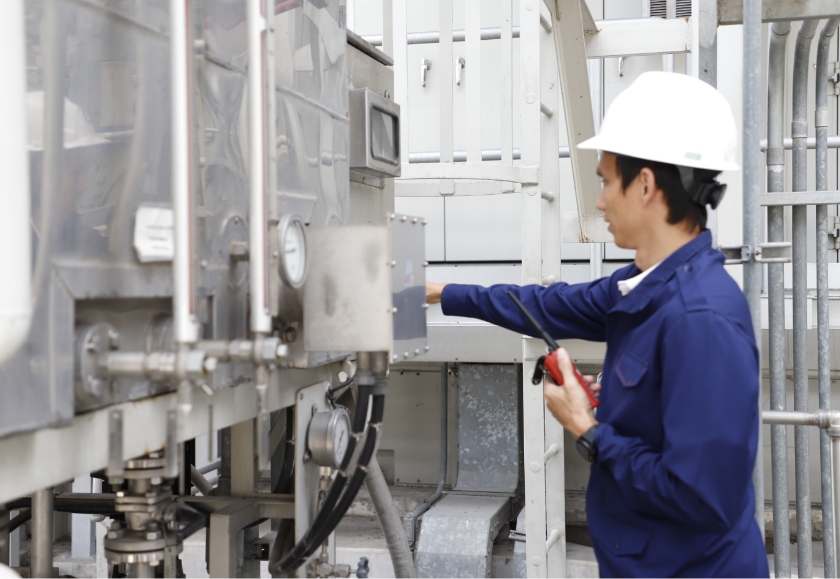
Outcomes in 2024
1,839
MWh/year
40
m2year
6.83
million baht/year
847.37
tCO2e/year
Achievement:
The Online Water Wash project not only reduces energy and water resource consumption but also demonstrates CKPower’s commitment to sustainable innovation development and environmental impact reduction. This initiative also enhances gas turbine system reliability, reduces maintenance frequency, and extends equipment lifespan in the production process.
Benefits:
- Advancement of CKPower’s GHG reduction targets
- Promotion of resource efficiency
- Alignment with CKPower’s corporate sustainable development framework
6) Off-peak Gas Compressor Power Reduction Project at Bangpa-in Cogeneration Power Plant
The engineering team at Bangpa-in Cogeneration Power Plant discovered that the excessive pressure of the gas compressor activated the excess flow valve system, resulting in energy loss.
They studied and improved the excess flow valve system and reduced the pressure of the gas leaving the pistons to ensure that the valve system would not be triggered, efficiently reducing energy wastage in the gas compression process.

Outcomes in 2024
consumption from 980 kW to
860
kW
375
MWh/year
109.95
tCO2/year
885,000
baht/year
Achievement:
This project demonstrates CKPower’s commitment to optimizing energy production and reducing off-peak energy losses. Beyond cost and energy reductions, the project reduces environmental impact through GHG emission reductions and showcases the engineering team’s capabilities in implementing innovative solutions for positive organizational and environmental impact.
Benefits:
- Advancement of CKPower’s GHG reduction targets
- Long-term cost reduction
- Enhancement of corporate image as a sustainability and energy efficiency focused organization
7) Electric Vehicle Project at Xayaburi Hydroelectric Power Plant
The Xayaburi Hydroelectric Power Plant replaced diesel-powered vehicles with electric vehicles to support GHG reduction goals and promote clean energy adoption.
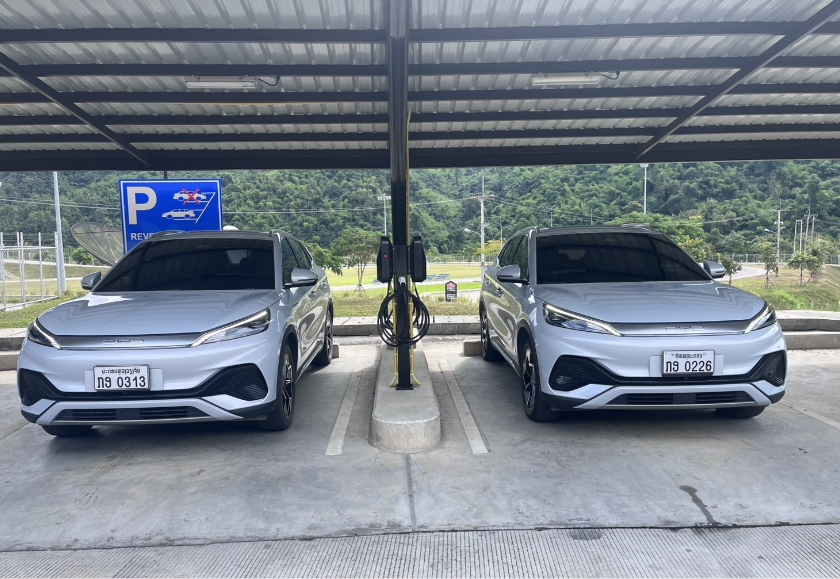
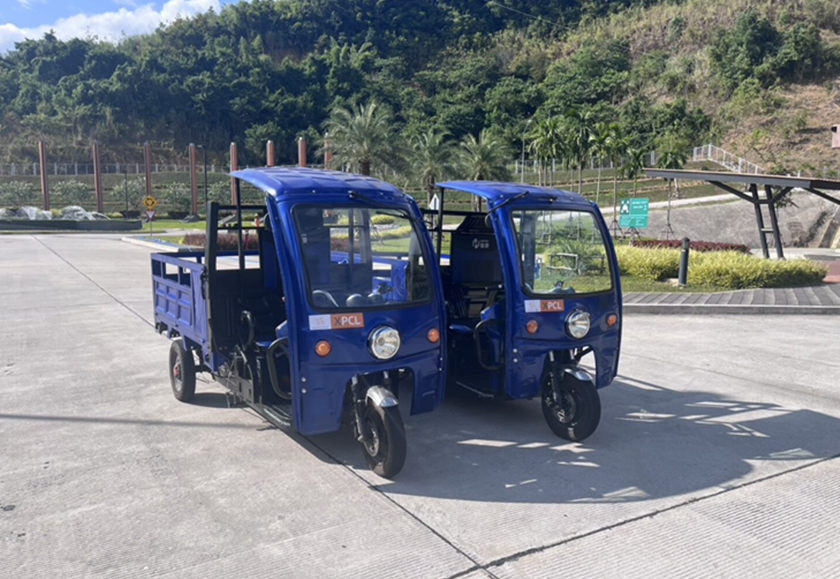
Outcomes in 2024
- Addition of 1 electric vehicle, bringing the current EV fleet to 2 vehicles
- 2 electric three-wheelers in active service
39,329.20
km
4,712.39
liters
Achievement:
This initiative aligns with CKPower’s sustainability goals, reducing fossil fuel dependency while promoting environmental responsibility.
Benefits:
- Advancement of CKPower’s GHG reduction targets
- Promotion of clean energy use in the organization
- Fostering sustainability awareness among employees and communities
8) Water Truck Usage Reduction Project for Garden and Landscape Maintenance at Xayaburi Hydroelectric Power Plant
The Xayaburi Hydroelectric Power Plant enhanced its water management system for garden, lawn, and tree maintenance by replacing water trucks with a pipeline network covering required areas, reducing fossil fuel consumption.
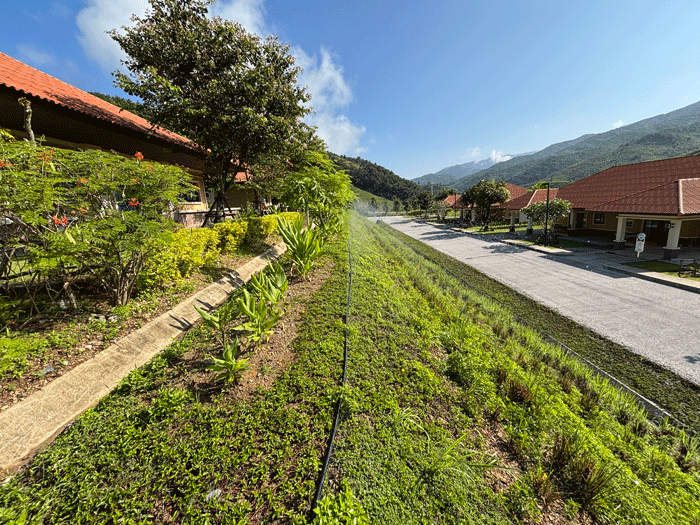
Outcomes in 2024
330
liters/month
lowering fuel-related emissions
Achievement:
This project demonstrates CKPower’s commitment to reducing GHG emissions and promoting resource efficiency. The green space maintenance system improvement through pipeline installation has reduced fossil fuel dependency, lowered costs, and increased operational efficiency.
Benefits:
- Advancement of CKPower’s GHG reduction targets
- Reduction of diesel expenses
- Promotion of sustainability in green space maintenance
9) Chiller Efficiency Optimization Project at Nam Ngum 2 Hydroelectric Power Plant (In Progress)
The Nam Ngum 2 Hydroelectric Power Plant initiated the optimization project for its chiller to reduce electrical power consumption within the plant and improve the cooling system performance. The project began with a comprehensive study and inspection of the existing chiller system, which revealed equipment deterioration due to long-term use.
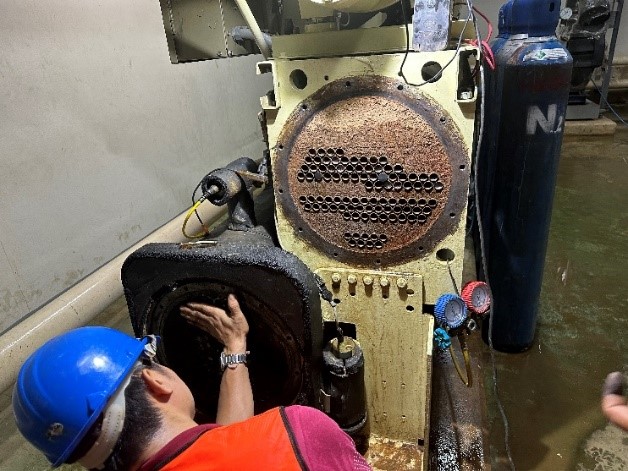
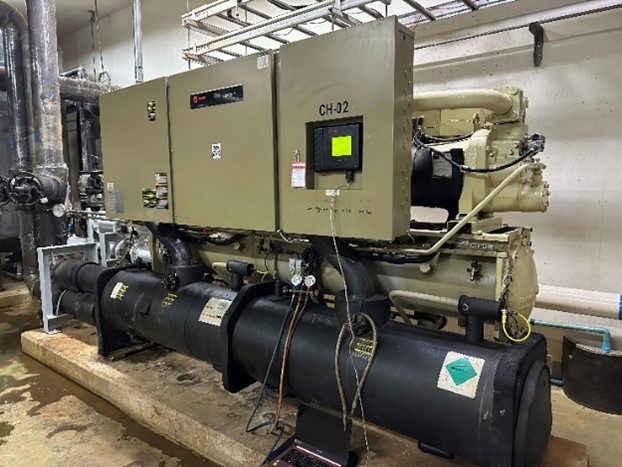
Project implementation:
- Maintenance and detailed inspection of the chiller system was conducted.
- Following assessment and analysis, a decision was made to replace the chiller in use with a new unit to improve operational efficiency and reduce energy consumption.
- The target is a minimum 3% reduction in chiller power consumption compared to the previous chiller.
Target and timeframe
The project is ongoing and is expected to be completed in 2025.
Expected Outcomes
and significant GHG emission reductions
Anticipated achievement:
This initiative is part of CKPower’s commitment to leveraging cutting-edge technology to enhance operational efficiency and sustainability. Benefits:
Benefits:
- Long-term chiller system reliability
- Advancement of CKPower’s net-zero targets
- Reduction of electricity consumption and enhancement of overall operational efficiency
Overall Performance of Energy Conservation Projects in 2024 |
||||||
|---|---|---|---|---|---|---|
| Reduction in energy consumption |
4,444.3
|
4,770
|
Reduction in GHG emissions |
2,054.49
|
Reduction in energy costs |
16.59
|
| Performance Breakdown by Project | ||||||
Project |
Type of energy reduction | Reduction in energy consumption | Reduction in GHG emissions (tCO2e/year) | Reduction in energy costs (baht/year) | ||
| Internal Combustion Engine to PHEV Transition Project | Fuel |
58
|
0.155 |
190,643 |
||
| Lower Gas Pressure - Better Heat Rate Project | Fuel |
688
|
343.9 |
2,561,520 |
||
| Steam Turbine Load Adjustment Project Phase 2 | Fuel |
1,422
|
657.21 |
5,295,432 |
||
| Deactivation of a Cooling Fan during Off-peak Periods (00:00-06:00 hrs.) | Fuel |
34.3
|
43.52 |
350,648 |
||
| Cooling Tower Optimization Project | Fuel |
86
|
39.75 |
320,317 |
||
| Online Water Wash Project | Fuel |
1,839
|
847.37 |
6,830,000 |
||
| Off-peak Gas Compressor Power Reduction Project | Fuel |
375
|
109.95 |
885,000 |
||
| Electric Vehicle Project | Fuel |
4,712.39
|
12.63 |
155,508 |
||
| Water Truck Usage Reduction Project for Garden and Landscape Maintenance | Fuel |
In progress |
In progress |
In progress |
||
| Chiller Efficiency Optimization Project | Electricity |
In progress |
In progress |
In progress |
||